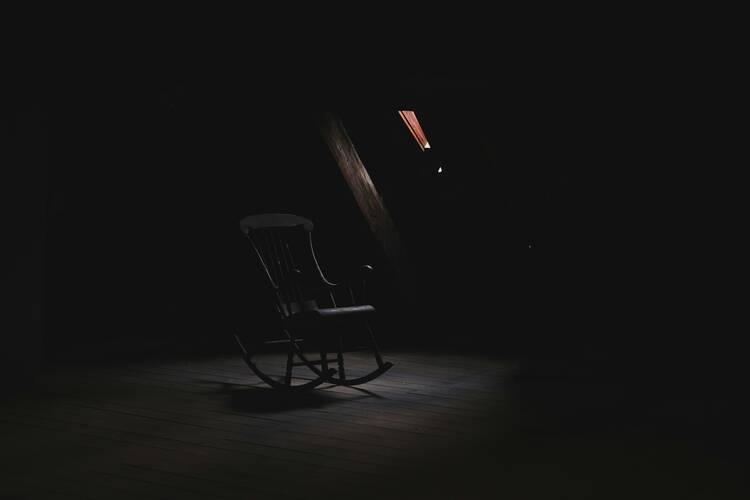A Reflection for Wednesday of the Thirteenth Week in Ordinary Time
Find today’s readings here.
The swineherds ran away,
and when they came to the town they reported everything,
including what had happened to the demoniacs.
Thereupon the whole town came out to meet Jesus,
and when they saw him they begged him to leave their district. (Mt 8:33-34)
Today’s Gospel opens with a scene fans of the “28 Days,” “Weeks” and “Years Later” zombie apocalypse films will have no trouble imagining. Jesus, coming along a dusty road into the “territory of the Gadarenes,” encounters two “demoniacs,” lunging at him from a tomb where they have been no doubt consigned by families and neighbors, men “so savage that no one could travel by that road.”
The path they menaced no doubt lay on the edge of the village where its dead were entombed, this meager trail the only earthly domain for the haggard demoniacs. They allowed no one to pass along it unmolested, but encountering Jesus they recognize a force they cannot intimidate and cannot withstand.
He frees the two men from their enslavement and sends the demons who had controlled them and terrorized the community into a herd of pigs. The Gadarenes are clearly not Jews, swine herders who eat and trade in pig flesh.
The herd of now possessed pigs rush into the sea and drown, a costly loss for a poor community. How did the villagers repay Jesus for this act of mercy and the liberation of their former family members and neighbors from their diabolical enthrallment? Not well.
We say all the time “better the devil you know.” Of course none of us suspect that we would ever be in the position to really mean that.
In Jesus’ time this Gentile village quite literally accepted that sentiment. Coming face to face with the devils they knew and perhaps the ones they feared lurking inside themselves, the Gadarenes decided they preferred retaining them rather than confront something they found more frightening, this new possibility of mercy and restoration Jesus held up for them, one overloaded with risk and uncertainty and, yes, one that disrupts the way things have always been.
In the end the Gadarenes did not beg for the savior’s help in ridding themselves of their demons; they asked instead for Jesus to leave them in peace with their sorrows and torments intact and to take his radical mercy somewhere else.
How much could we free ourselves from if we had the courage to follow where a spirit of mercy, forgiveness and compassion leads? How wedded are we to the patterns, however toxic and ruinous they may be, with which we have managed ourselves, our families, our communities, our nations?
In times of war, we are eager to assume great risks for military victory, especially when someone else’s child bears that burden, but how difficult it has proved to take risks for the peace demanded by the Gospel. So much easier to remain set in our ways, hanging on to familiar patterns of anger and recrimination. Even the basest cruelty can be a comfort to hearts that have become like stone.
I think especially this week of the patterns of violence and recrimination that we’ve been revisiting in the Holy Land and now across the Middle East. The demons we’ve nurtured for decades, either in ourselves or the shadowed images we create of antagonists and threats. How incapable we seem to be to drive them out, to liberate ourselves and imagine different relationships. How hard it is to attempt a different course, this one grounded in peacemaking and justice, not victory and subjugation, not more violence and “total surrender.”
In today’s first reading we learn a little of the lineage of the Arab and Jewish people of Israel and Palestine, their familial closeness perhaps a key to the animosity which continues to rage over centuries.
The desert God makes incredible promises to Sarah and Abraham, but also to the Egyptian slave woman Hagar—that their combined progeny would never be bereft of God’s attention and love but would be the founders of great nations.
Hagar is driven from Abraham’s tent to satisfy the anxieties and jealousy of Sarah. She is abandoned on the Negev desert, perhaps 100 miles or so from today’s catastrophe in Gaza. The meager supplies Abraham provisioned her with, “some bread and a skin of water,” are quickly exhausted. Dying of thirst, Hagar is on the verge of surrendering all hope. She turns away, unwilling to witness her son Ishmael perish in the desert.
But God’s messenger intervenes:
“What is the matter, Hagar?
Don’t be afraid; God has heard the boy’s cry in this plight of his.
Arise, lift up the boy and hold him by the hand;
for I will make of him a great nation.”
Then God opened her eyes, and she saw a well of water.
She went and filled the skin with water, and then let the boy drink.
The Scripture suggests enough abundance for all to share in the promised land and the power of mercy to overcome recrimination and violence. But to embrace that unburned offering, we have to first rid ourselves of demons of distrust and wrath, revenge and retribution.
It is no easy thing to break free of our demons; we have cared for them for such a long time and they ask so little of us, only that we turn to them again and again and again.








